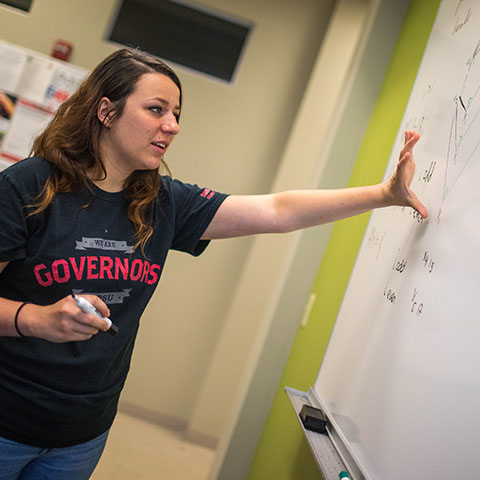Why Study Mathematics Instruction
The Mathematics Instruction Concentration is ideal for anyone wishing to extend their knowledge of mathematics for the purpose of instruction. It is primarily tailored for current licensed secondary mathematics teachers who may want to add a master’s degree or become qualified to teach dual enrollment or community college level mathematics. This program does not lead to initial licensure.
With a mix of online and on-campus courses, the Master of Science in Quantitative Methods with a concentration in Mathematics Instruction will immerse you in advanced mathematics coursework as well as the latest research-based methods and best practices for teaching mathematics.
Equipped with teaching certifications and years of hands-on experience in mathematics content and pedagogy, APSU’s faculty are here to provide you with the practical skills and knowledge you will need to be an effective teacher of mathematics. The faculty are also active in local, state, and national professional mathematics education organizations.
The coursework in this concentration is designed to increase students’ mathematics content and pedagogy skills. Over the course of two years students take three courses in summer and one course each in the spring and fall semesters so that students may complete their degrees while continuing to work full-time as a teacher of secondary mathematics.
Students who complete the program work as secondary mathematics teachers, dual-enrollment secondary teachers, adjuncts or full-time instructors in post-secondary institutions.
Admission Requirements
For information related to admission requirements please visit the graduate bulletin.
What Will I Learn
The National Board for Professional Teaching Mathematics Certification Standards consist of the following standards:
-
Students will synthesize and apply advanced mathematics knowledge to solve mathematical problems.
-
Students will develop the communication skills necessary to consult with educational professionals and other stakeholders, including presentations at professional conferences and workshops.
-
Students will apply the National Council of Teachers of Mathematics (NCTM) and National Board for Professional Teaching (NBPTS) Mathematics Standards to planning, instruction, and assessment for all students, including those of low SES, linguistic/cultural minorities, and those with IEPs.
-
Students will synthesize research in mathematics education resulting in the completion of a research essay or project.
-
Students will analyze data, draw appropriate conclusions, and make recommendations while recognizing the effect of assumptions and the limitations of the analysis.
